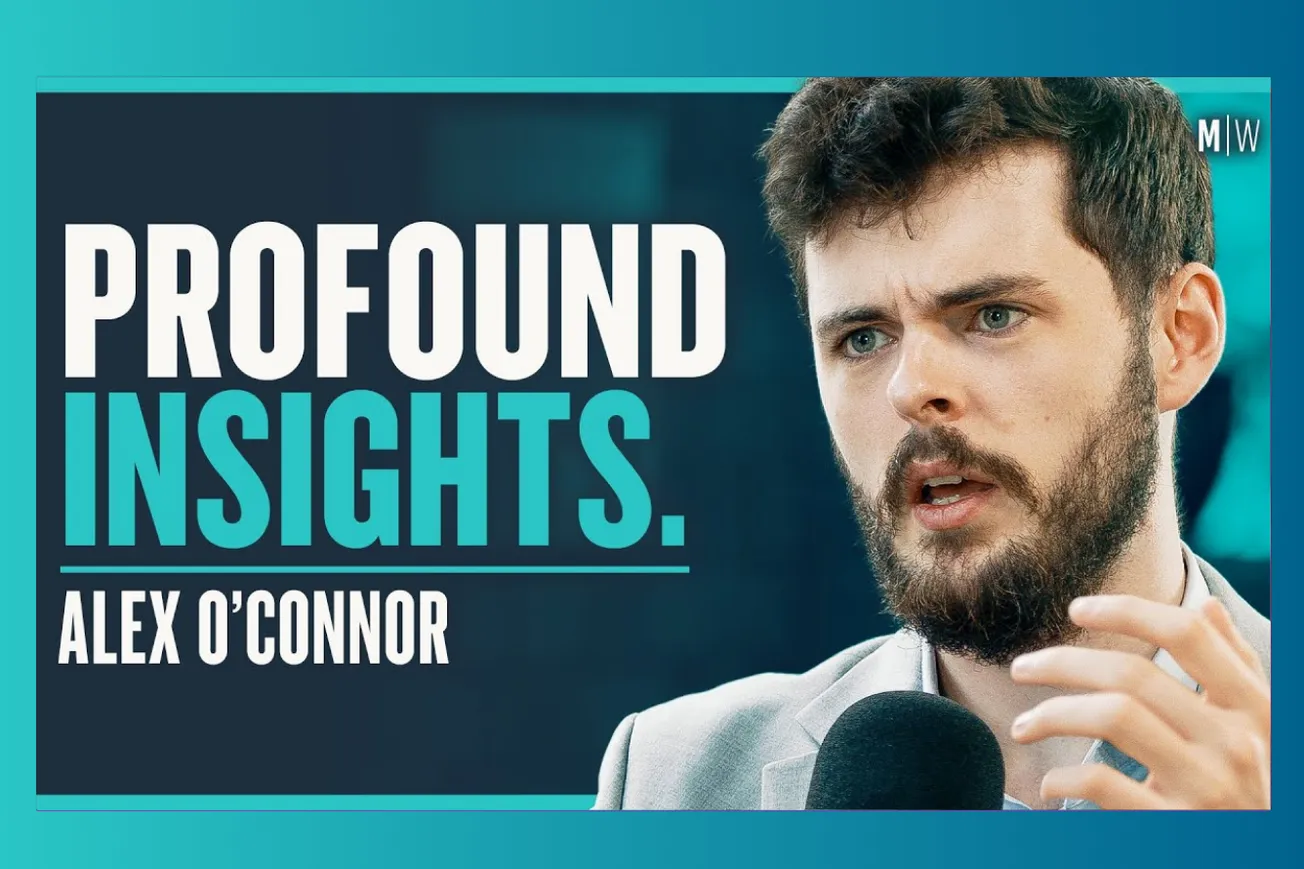Table of Contents
Philosopher Alex O'Connor explores how ancient philosophical problems like the nature of knowledge, ethics as emotion, and the search for meaning remain surprisingly relevant to modern life decisions and wellbeing.
Key Takeaways
- Most ethical debates are actually factual disagreements disguised as moral differences - clarifying underlying assumptions prevents endless circular arguments
- Knowledge requires more than just true beliefs - Gettier cases show you can have justified true beliefs that still don't constitute genuine knowledge
- Ethics may be fundamentally emotional rather than rational - recognizing this can help you understand your moral intuitions and reactions
- Terror Management Theory suggests much human behavior stems from unconscious death denial, including health obsessions and productivity culture
- The anthropic principle creates paradoxes where multiple valid perspectives on the same problem yield contradictory conclusions
- Fine-tuning arguments for God's existence remain compelling despite potential scientific explanations for universal constants
- Historical evidence for Jesus's resurrection presents genuine puzzles regardless of your religious beliefs
- Nihilism as a philosophical position doesn't necessarily lead to nihilistic behavior due to evolved psychological mechanisms
- Free will debates miss the point - we cannot escape the illusion of agency even if determinism is true
- New atheism succeeded at criticism but failed to provide constructive alternatives to religious meaning-making systems
Timeline Overview
- 00:00–20:00 — Peter Hitchens interview controversy, walkout analysis, and Alex's vindication after initial uncertainty about posting the confrontational episode
- 20:00–40:00 — Ben Shapiro debate experience, assessment of Shapiro's intellectual honesty and debating style, hidden humility in argumentative engagement
- 40:00–60:00 — Edmund Gettier's revolutionary challenge to justified true belief theory of knowledge, demonstrating how philosophy experiences genuine paradigm shifts
- 60:00–80:00 — Meta-ethics foundation for ethical discussions, AJ Ayer's emotivism theory treating moral statements as expressions of emotion rather than factual claims
- 80:00–100:00 — Terror Management Theory explaining human behavior as death denial, mortality salience effects on judicial decisions and cultural attachments
- 100:00–120:00 — Health and fitness culture as disguised death denialism, productivity movement as attempt to extract more life from limited time
- 120:00–140:00 — Anthropic dice killer paradox showing how different analytical frameworks produce contradictory but valid conclusions to identical problems
- 140:00–160:00 — Famous mathematical and logical paradoxes, Olbers' paradox about infinite universe implications, fine-tuning argument for divine design
- 160:00–180:00 — Historical evidence for Jesus's resurrection, gospel reliability through contradictions, mythological development versus authentic testimony
- 180:00–200:00 — Nihilism experiment, living without non-contingent reasons for action, cultural meaning-making as evolutionary adaptation
- 200:00–220:00 — Free will illusion, compatibilism as definitional dodge, moral responsibility in deterministic universe
- 220:00–240:00 — Religion's historical persecution of developments it now claims, judeo-christian value appropriation criticism
- 240:00–260:00 — New atheism's success at criticism versus failure to provide constructive alternatives, necessity of building rather than only destroying
The Peter Hitchens Confrontation and Intellectual Honesty
- Alex O'Connor faced a dilemma when Peter Hitchens walked out of their interview and demanded it not be published, claiming O'Connor was "a propagandist for drug decriminalization" despite having discussed the topic only once previously
- Hitchens accused O'Connor of "intentionally tricking him" into a drugs conversation, though O'Connor had explicitly mentioned this as one of three potential topics in advance communication
- The confrontation revealed common debate pathologies where experienced debaters employ an "I know this one" attitude, answering questions they expect rather than questions actually asked
- Hitchens spent "17 entire minutes stood at the door" telling O'Connor how much he "personally dislikes" him while simultaneously claiming he didn't want the interview published
- O'Connor's decision to publish demonstrated intellectual integrity - when guests make unreasonable demands based on false accusations, accommodation enables bad behavior
- The incident illustrates how some public intellectuals become trapped in performative personas, unable to engage authentically when challenged on their actual positions
- Reverse ageism creates dismissive attitudes where older intellectuals prejudge younger questioners as "whipper snappers" unworthy of serious engagement
Ben Shapiro's Hidden Intellectual Humility
- Despite public perception of Shapiro as a "bit of a grifter" who specializes in "owning college students," O'Connor discovered genuine intellectual engagement beneath the performative layer
- Shapiro demonstrates "hidden humility" that emerges not through emotional concessions but through subtle argument modifications based on counterpoints
- His exceptional "verbal IQ" allows him to "construct a sentence out of nowhere and do it very quickly" while building arguments that "glued together into one wall of text"
- The key insight is that Shapiro "matches the energy that he's given" - serious engagement produces serious responses rather than the "slightly sneering smug" persona
- O'Connor observed that Shapiro genuinely listens and adjusts his positions when presented with compelling objections, showing intellectual flexibility disguised as argumentative rigidity
- This pattern suggests that many public intellectuals possess greater nuance than their public personas suggest, but adapt their communication style to audience expectations
- The experience demonstrates the importance of engaging people in good faith rather than approaching them through preconceived notions about their intellectual honesty
Gettier Cases and the Nature of Knowledge
- Edmund Gettier's 1963 paper revolutionized philosophy by showing that "justified true belief" (JTB) - the consensus definition of knowledge since Plato - was insufficient
- Gettier cases involve situations where you have justified beliefs that happen to be true but seem intuitively different from genuine knowledge
- The classic example: believing the job candidate with 10 coins will get the position because you expect to get it and have 10 coins, but the other candidate gets it and also has 10 coins
- A simpler case: looking at a broken watch that shows the correct time by coincidence - you have justified true belief about the time but don't actually "know" it
- These cases sparked decades of philosophical debate about adding conditions to JTB: causal connections, reliability, safety, sensitivity requirements
- The broader lesson is that seemingly simple concepts often contain hidden complexities that require careful analysis to untangle
- Most philosophical progress involves "consistency tests" rather than empirical discoveries, examining whether our conceptual frameworks hold together under scrutiny
Ethics as Emotional Expression
- AJ Ayer's emotivism theory suggests that moral statements like "murder is wrong" are essentially expressions of emotion equivalent to "boo murder" rather than factual claims
- This theory was so threatening to traditional moral philosophy that stories tell of professors literally throwing the book out windows to avoid discussing it
- Ayer's verification principle held that meaningful statements must be either analytically true (tautologies) or empirically verifiable - ethical statements are neither
- The practical implication is recognizing how emotions dominate ethical thinking rather than rational argument, even when we believe we're being logical
- Most ethical debates are actually factual disagreements about statistics, causation, and consequences rather than genuine moral disagreements
- Gun control debates focus on death statistics and effectiveness rather than underlying ethical questions about liberty versus security
- Abortion debates center on biological facts about consciousness and viability rather than fundamental questions about personhood
- Understanding this distinction can help resolve apparent ethical conflicts by identifying the factual disagreements that generate moral-seeming disputes
Terror Management Theory and Death Denial
- Terror Management Theory proposes that all human behavior stems from managing fear of death, with cultural activities serving as "death-denying" mechanisms
- Mortality salience experiments show that simply reminding people of death changes their behavior in predictable ways across multiple domains
- Judges reminded of death set significantly higher bonds for prostitution cases, supposedly because legal system participation helps deny mortality through transcendent meaning
- People reminded of death become more religious (even atheists), more nationalist, more materialistic, and more hostile to outgroups
- The productivity movement represents death denial through attempting to extract more output from limited lifespan
- Health and fitness obsessions, longevity movements, and biohacking culture mask death anxiety behind optimization language
- Nutrition debates become passionate because different approaches implicitly promise different lifespans, threatening others' mortality management strategies
- The intensity of health and fitness arguments reflects underlying terror about death rather than genuine concern about immediate wellbeing
The Anthropic Dice Killer Paradox
- This thought experiment demonstrates how different analytical frameworks can produce contradictory but equally valid conclusions about identical situations
- A killer kidnaps people in exponentially growing groups (1, 2, 4, 8, etc.) and kills each group with probability 1/6 until rolling a six
- From individual perspective: 1/6 chance of death seems better than pushing a button with 1/2 chance of death
- From population perspective: you're more likely to be in the final (killed) group than any surviving group, making button-pressing rational
- The paradox reveals how perspective determines analysis - individual versus population viewpoints yield opposite recommendations
- Similar logic applies to anthropic principle arguments about human existence timing during exponential population growth
- This connects to broader questions about how framing effects and analytical perspectives shape apparently objective reasoning
- The insight applies beyond philosophy to any situation where individual and collective rationality diverge
Fine-Tuning Arguments and Divine Design
- Fine-tuning arguments observe that universal constants (gravitational force, etc.) fall within incredibly narrow ranges necessary for matter formation and life
- Christopher Hitchens acknowledged this as the most compelling argument for God's existence, though it didn't convince him personally
- Three potential explanations: chance (seems vanishingly unlikely), necessity (constants couldn't have been different), or design (intelligent creator)
- The anthropic principle response - that observers can only exist where observation is possible - seems insufficient for fundamental constants
- Unlike biological fine-tuning (Earth's distance from sun), universal fine-tuning involves conditions for any possible life anywhere
- Josh Perry's analogy: 100,000 skilled knife-throwers missing you perfectly would suggest intention despite anthropic survival bias
- O'Connor remains skeptical but finds these arguments more compelling than others for God's existence
- The key difference is that scientific explanations seem more plausible for fine-tuning than for perennial philosophical problems like evil and divine hiddenness
Historical Evidence for Jesus's Resurrection
- The resurrection argument relies on historical facts requiring explanation rather than direct proof of supernatural events
- Established facts: Jesus existed, taught, was crucified, and followers claimed to see him alive afterward despite persecution
- Gospel contradictions on minor details actually support rather than undermine historical reliability - coordinated fabrication would eliminate contradictions
- Romans were experts at execution; survival from crucifixion is highly unlikely given their thoroughness including spear-wound verification
- Disciples' willingness to die for resurrection claims suggests genuine belief rather than knowing deception
- Group appearances and Paul's reference to 500 simultaneous witnesses rule out individual hallucination explanations
- However, mythological development from Mark (no post-resurrection appearances) to John (doubting Thomas story) suggests legendary embellishment
- The most honest assessment acknowledges genuine historical puzzles while noting the prior improbability of resurrections generally
- Process-of-elimination arguments can be run in reverse - group hallucinations become plausible when resurrection is deemed impossible
Nihilism and the Meaning-Making Machine
- O'Connor experimented with living as a genuine nihilist, rejecting non-contingent reasons for action beyond biological drives and preferences
- Most people who claim nihilism don't actually live nihilistically due to embedded cultural programming and evolved moral intuitions
- Penn Jillette's response to "why don't atheists kill everyone they want?" - "I do kill everyone I want to, which is nobody" - illustrates this point
- The challenge isn't that nihilism leads to murder but that cultural meaning-making serves important psychological and social functions
- Explaining moral taboos through evolutionary history removes their ethical force, creating the nihilistic threat to social cooperation
- Religion provides ready-made meaning frameworks that feel transcendent even when understood as cultural constructions
- The comfort of modern life may have made genuine moral sacrifice so rare that people forget their capacity for principled action
- Mr. Beast's poll revealing many would kill a random stranger for a million dollars suggests comfort-induced moral atrophy rather than religious decline
Free Will Illusions and Moral Responsibility
- The free will illusion persists even when intellectually rejecting libertarian free will, similar to visual illusions that continue despite understanding
- Compatibilist attempts to preserve free will through redefinition amount to the "Atlantis fallacy" - pointing to Venice when asked about Atlantis
- Sam Harris and Daniel Dennett's extended debate exemplifies this, with Dennett defending concepts that don't address what people actually care about regarding agency
- The practical question "what would it look like to act as though free will doesn't exist?" reveals the incoherence of such demands
- Deterministic arguments predict you'll get out of bed because you desire breakfast - the framework explains behavior rather than eliminating it
- Ben Shapiro's challenge about atheists not living like free will skeptics misunderstands what deterministic behavior would actually entail
- Arthur Schopenhauer's formulation: "you can do what you will, you just can't will what you will" captures the experienced constraint within apparent freedom
- People resist free will discussions because they threaten felt agency even when the arguments don't actually change behavior
Religion's Historical Revisionism
- Contemporary religious arguments increasingly claim ownership of social developments that religious institutions historically opposed
- Women's rights, homosexual acceptance, scientific revolution, and abolitionist movements all faced religious persecution initially
- The pattern involves religious institutions showing "instruments of torture to Galileo" then later claiming the Scientific Revolution as judeo-christian in origin
- Old Testament explicit slavery instructions become reframed as inspiring the Abolitionist Movement through creative reinterpretation
- St. Paul's restrictions on women teaching or having authority become foundations for social justice movements in retrospective accounts
- This represents "relatively offensive" appropriation of achievements made "against the very religious traditions that now like to claim them"
- The phenomenon resembles being "punched in the face by somebody who then comes over and gives you a bandage for it"
- Early scientists' religious beliefs become evidence for science-religion compatibility, ignoring that they predated mechanisms that would challenge their beliefs
New Atheism's Constructive Failure
- New atheism succeeded at criticism - "cutting down forests" - but failed at construction - "irrigation of deserts" (quoting CS Lewis)
- The movement effectively identified problems with religious truth claims but provided no replacement meaning-making systems
- This created a situation where people feel "naked" after discarding religious frameworks, scrambling for "any clothes" rather than carefully chosen alternatives
- Karl Marx exemplifies the pattern: brilliant diagnosis of problems, catastrophic attempts at practical solutions
- Simon Cowell analogy: critics can't write songs, but someone needs to do the building rather than only pointing out flaws
- The recent "anti-new atheist" backlash partially reflects this constructive vacuum rather than purely intellectual disagreement
- Ben Shapiro's challenge about atheists going to art galleries reveals the assumption that aesthetic appreciation requires transcendent grounding
- O'Connor's response highlights the practical impossibility of genuine belief manipulation: you cannot simply choose to believe what you think is false
- The "gun is always loaded" principle works for safety but breaks down in high-stakes situations requiring actual belief rather than behavioral as-if assumption
Conclusion and Practical Implications
Alex O'Connor's philosophical explorations reveal how ancient questions about knowledge, ethics, and meaning remain remarkably relevant to contemporary life. His analysis suggests that much of what we take for granted about morality, rationality, and purpose deserves deeper examination. The conversations highlight how philosophical thinking can illuminate the hidden assumptions underlying our beliefs while also revealing the practical limitations of pure rationality in human affairs. The tension between intellectual honesty about uncertainty and the psychological need for meaning represents one of the central challenges of thoughtful living.
Practical Implications
- Recognize that most ethical disagreements are actually factual disputes - focus on clarifying underlying empirical questions before arguing about values
- Understand that moral intuitions are largely emotional responses rather than rational conclusions, which can help you evaluate your reactions more objectively
- Notice how death anxiety may be driving seemingly unrelated behaviors like productivity obsessions, health fanaticism, or material accumulation
- Accept that some philosophical problems (like free will) may be intellectually resolvable but experientially persistent due to evolved psychological mechanisms
- Distinguish between criticism and construction in your own thinking - identifying problems is easier than proposing workable solutions
- Consider how different analytical frameworks can yield contradictory but valid conclusions, suggesting the importance of perspective-taking in complex decisions
- Acknowledge that meaning-making systems serve important psychological functions even when their truth claims are questionable
- Practice intellectual humility by genuinely engaging with positions you disagree with rather than dismissing them through caricature
- Examine whether your own beliefs would survive the same scrutiny you apply to others' beliefs
- Maintain curiosity about philosophical questions while accepting that perfect certainty may be impossible in most domains that matter for human flourishing





